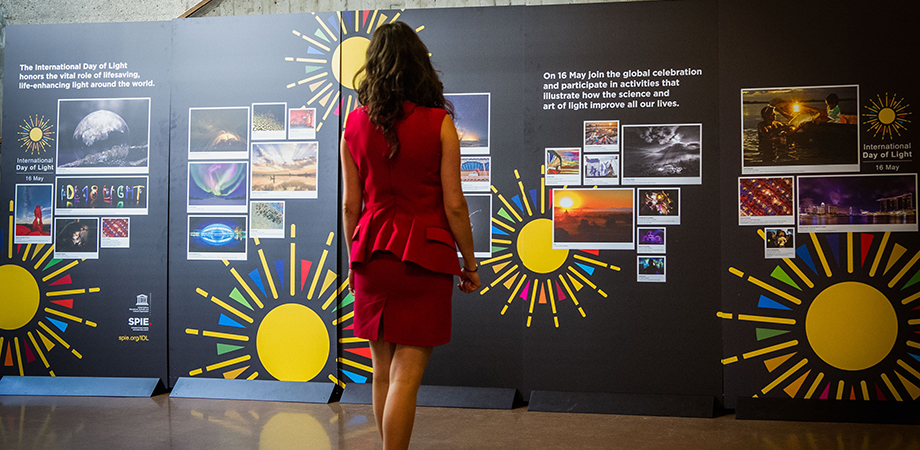First annual International Day of Light
The legacy activity follows the success of 2015's International Year of Light and Light-based Technologies, and will provide an annual focus on the achievement of light science and its applications.

 The inaugural International Day of Light was a huge success, with celebrations happening all around the world. A legacy activity of the highly celebrated 2015 International Year of Light and Light-based Technologies (IYL), the International Day of Light (IDL) provides an annual focal point for the continued appreciation of the central role that light plays in the lives of the citizens of the world in areas of science, culture and art, education, sustainable development, and in fields as diverse as medicine, communications, and energy.
The inaugural International Day of Light was a huge success, with celebrations happening all around the world. A legacy activity of the highly celebrated 2015 International Year of Light and Light-based Technologies (IYL), the International Day of Light (IDL) provides an annual focal point for the continued appreciation of the central role that light plays in the lives of the citizens of the world in areas of science, culture and art, education, sustainable development, and in fields as diverse as medicine, communications, and energy.
The recurring IDL date of 16 May marks the anniversary of the first successful operation of a laser by physicist and engineer Theodore Maiman in 1960. SPIE is an IDL Steering Committee member and has been a leader in launching and supporting both the IYL and the IDL.
To raise awareness around the International Day of Light, SPIE created free digital resources for those in the community wishing to participate. In addition to the logo, graphics, posters, bookmarks, and a video; worksheets were made available in multiple languages. Micro-grants were also awarded to support IDL activities in India, Argentina, Thailand, Italy, Pakistan, South Africa, New Zealand, Mexico, Canada, the UK, and the US. On 16 May, SPIE launched its 2018 International Day of Light photo competition, which is open to people of all ages, both amateur and professional (see spie.org/IDL for details).
The inauguration of the IDL took place at UNESCO Headquarters in Paris on 16 May 2018 with both outgoing and new SPIE CEOs, Eugene Arthurs and Kent Rochford, in attendance.
"As early supporters of both the International Year of Light in 2015 and the now-annual International Day of Light, SPIE is proud to continue its support during this year's event," said new SPIE CEO Kent Rochford. "A critical part of the SPIE mission is to advance the science of light and light-based technologies, and draw attention to the many ways in which light improves and enhances our lives on a daily basis."

Nobel Laureate Kip S. Thorne gave a presentation on LIGO and LISA. Credit: UNESCO/N.Houguenade
The event brought together international leaders to raise awareness of the many ways that light impacts modern society, and to consider how advances in light-based science and technology can aid in achieving goals in education and sustainable development. Science and industry leaders, national delegates and sponsors, diplomats and decision-makers from across the globe, science enthusiasts, and students gathered for presentations that included a talk by 2017 Nobel Prize winner for Physics, Kip S. Thorne.
Thorne's presentation focused on LIGO, which he likened to working with Frankenstein because, "it has 100,000 different data channels, each with its own personality that needs to be learned and understood." Thorne also discussed the future of LIGO and LISA, the Laser Interferometer Space Antenna, which researchers hope will be able to observe the big bang by the year 2050.
A group light painting from the International Day of Light in Paris. Credit: LPWA/LFLP
In addition to the presentations, an on-site exhibition included an augmented reality/virtual reality demonstration by SPIE Fellow Bernard Kress alongside displays from the Light Painting World Alliance (LPWA), the Museum of Light, and numerous other exhibits. Artist Kari Kola, who created a work of light art for IYL2015, returned with another light installation titled "Day and Night in Paris" that covered the Fontenoy building at UNESCO Headquarters during the event.
"The International Day of Light provides us all with the opportunity to promote the importance of optics and photonics to society on May 16 every year," noted SPIE Member and IDL2018 Steering Committee Chairman John Dudley. "Achieving the recognition of an International Day proclaimed by UNESCO is a remarkable success, and I'd like to express my personal thanks and appreciation to SPIE for their specific support of this project over many years, as well as their continual efforts in promoting education and humanitarian applications of light-based technologies."
Learn more at spie.org/IDL.
| Enjoy this article? Get similar news in your inbox |
|



